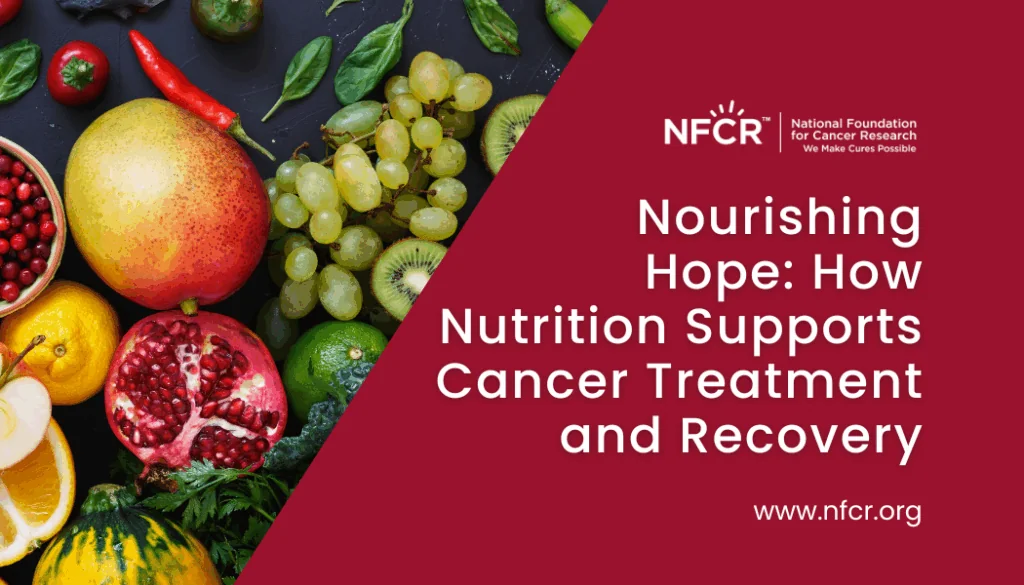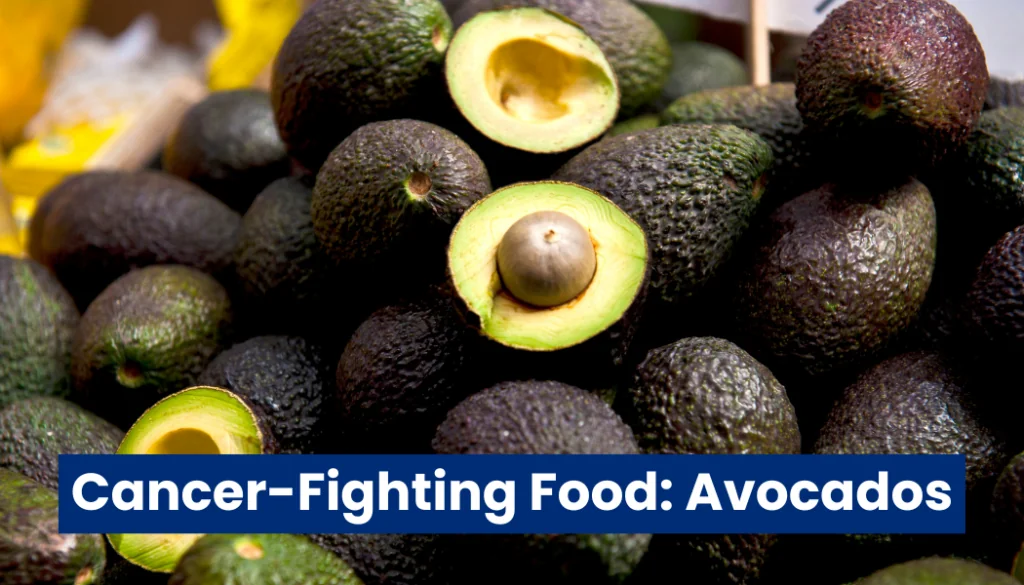Cancer-Fighting Lifestyle Channel
By eating healthy foods and sticking with a healthy lifestyle, you can prevent or significantly reduce your risk of cancer.
The Cancer-Fighting Lifestyle Channel is a program created by the National Foundation for Cancer Research (NFCR) to help you start and stick with a healthy lifestyle.
Watch the Latest Video on Youtube
Together for a Healthy Lifestyle
You won’t feel alone on your journey of maintaining a healthy lifestyle. By providing cancer-fighting food recipes and showing you how to cook them through videos, we will become your reliable partner and go along with you down the road.
In addition to learning how to cook healthy food, you will also learn the science and research that demonstrate the anti-cancer effects of those vegetables and foods included in the recipes in the video while the cooking is going on. The scientific knowledge may give you additional courage to stick with a healthy lifestyle.
Welcome and enjoy the program.
Find More Cancer-Fighting Food Inspiration
Nourishing Hope: How Nutrition Supports Cancer Treatment and Recovery
At the National Foundation for Cancer Research (NFCR), we know that food is more than fuel; it’s medicine. Proper nutrition during and after cancer treatment plays a vital role in healing, strengthening the body, and improving quality of life. While nutrition cannot cure cancer alone, a balanced, healthy diet can help your body cope with treatment, rebuild strength, and promote recovery. Why Nutrition Matters During Cancer Treatment Cancer treatments like chemotherapy, radiation, and surgery can affect your body’s needs in many ways: Increase the need for calories, protein, and nutrients Cause side effects like nausea, appetite loss, mouth sores, diarrhea, or taste changes Weaken the immune system, making it even more important to support the body with nourishing foods Good nutrition can help you: Maintain strength and energy Support healing and tissue repair Enhance immune function Manage side effects more effectively Improve treatment tolerance and overall well-being Key Principles of a Cancer-Fighting Diet Prioritize Plant-Based Foods Fill your plate with vegetables, fruits, whole grains, beans, and nuts. These foods are rich in fiber, vitamins, minerals, and antioxidants that support health. Include High-Quality Protein Protein is essential for maintaining muscle mass and repairing tissues. Good sources include lean meats, poultry, fish, eggs, dairy products, beans, tofu, and protein-rich shakes. Stay Hydrated Drink plenty of water throughout the day. Herbal teas, broths, and electrolyte solutions can help, especially if you are experiencing vomiting or diarrhea. Limit Processed and Sugary Foods Minimize consumption of heavily processed foods, sugary snacks, and red or processed meats. Focus on Healthy Fats Choose heart-healthy fats like olive oil, avocados, nuts, and fatty fish rich in omega-3 fatty acids. Coping with Common Eating Challenges Treatment can make eating difficult. Here are some tips: Remember: Flexibility is key; some days will be easier than others. Important Reminder About Supplements Some vitamins, herbs, or supplements can interfere with cancer treatments. Always talk to your oncologist or nutritionist before taking any supplements. Food-first nutrition is generally safest and most effective during treatment. NFCR’s Message to You At NFCR, we believe that nourishing your body is an act of hope and strength. Through thoughtful, balanced eating, you can help your body face treatment with resilience and lay a foundation for recovery. Remember: Every bite you take to nourish your body is a step toward healing. Every glass of water strengthens your system. Every small choice builds hope for a healthier future. You are not alone on this journey — NFCR is with you, supporting every aspect of your healing. Sign-up to Stay Informed About Cancer Research Breakthroughs with NFCR! Continue the Series, Read Next: Exercise During and After Cancer Treatment: Building Strength for Healing >>> A world without cancer is possible. Help us turn lab breakthroughs into life-saving realities. 5.7 Million+ Donors who have fueled NFCR's mission $420 Million+ Invested in high-impact research & programs 36+ Labs & Hundreds of Nobel Laureates & Key Scientists received NFCR funding, driving breakthrough research {{ vc_btn: title=MAKE+THE+DIFFERENCE&style=outline-custom&outline_custom_color=%23FF5012&outline_custom_hover_background=%23FFFFFF&outline_custom_hover_text=%23002C76&align=center&link=url%3Ahttps%253A%252F%252Fdev.nfcr.org%252Fmake-the-difference%252F }}Sign-up to Stay Informed About Cancer Research Breakthroughs with NFCR!
3 Delicious Winter Mocktails to Help You Decrease Your Alcohol Intake
Mocktails are on the rise! These cocktail alternatives have become increasingly popular as more people decide to cut alcohol out of their diets. Whether you are participating in Dry January, pregnant, or looking to decrease your alcohol intake, mock-cocktails provide healthy alternatives to popular beverages. Why Should You Decrease Your Alcohol Intake? Aside from quitting smoking, a healthy diet is the most effective way to reduce one’s risk of cancer. Worldwide research studies over many years indicate roughly 30-40% of cancer diagnoses could be prevented by modest diet and lifestyle changes. Per the U.S. Department of Health and Human Services, alcohol consumption is the third leading preventable cause of cancer in the United States. Unfortunately, less than half of Americans realize the risk. In early 2025, the U.S. Surgeon General recommended alcoholic beverages come with cancer risk warnings similar to tobacco products. Prevention remains our best weapon against cancer. Swap Cocktails for Mocktails An accessible way to reduce one’s alcohol intake is to swap cocktails for healthy and delicious mocktails. For an additional health bonus, consider using ingredients featured in NFCR’s Cancer-Fighting Food archive to boost your overall well-being and reduce your risk of cancer. Below is a selection of Winter Mocktails for you to try. Mulled Apple Cider Hot drinks, like Mulled Apple Cider, are a go-to winter option for those who want to stay warm and cozy. Apples boast a high amount of dietary fiber and polyphenol compounds, which partner with gut microbes to create an environment that may reduce one’s risk of cancer. With just 5 ingredients, you can make a delicious mulled apple cider in a crockpot or on the stovetop. Try this Mulled Apple Cider recipe from The Kitchn. You’ll need apple cider, an orange, fresh ginger, cinnamon sticks, and whole cloves. Galentine’s or Valentine’s Mocktail: Make a mocktail for someone you love! Whether it’s family, friends, or significant other, swapping a tasty mocktail with anticancer ingredients shows your love in more ways than one. To make a striking red drink, consider trying a Blood Orange Mocktail, like the recipe provided by Dash of Jazz. To make this drink, you will need blood oranges, sea salt, mint leaves, sparkling water, and a syrup sweetener of your choice. Using citrus fruit as a base for this mocktail means adding health benefits such as antioxidative, anti-inflammatory, anti-cancer, cardiovascular, and neuroprotective properties not often found in your standard cocktail. Super Bowl Mocktail: In the U.S., a list of staple events in winter usually includes the Super Bowl. Like many celebrations, this event can involve excessive drinking. For a no-alcohol drink option, try our Kickoff Mocktail! NFCR’s Kickoff Mocktail is a twist on a traditional Shandy, which typically combines beer and lemonade. To prepare the mocktail, combine a 12oz Non-Alcoholic Beer of your choosing with 1.5oz of orange juice (freshly squeezed for a healthier approach), 1.5oz of ginger beer, and a dash of pickle juice. Garnish with fruits or pickles to consume afterward. The orange in this recipe provides a vitamin C and folate boost that benefits X. The ginger in the ginger beer helps aid digestion and has [...]
The Strength of Avocados to Fight Cancer
Have you ever had the craving for fresh avocado toast in the morning? What about guacamole with a bit of a kick when you meet up with friends for lunch? Well, there’s some good news: you have inadvertently taken key steps to prevent cancer! Avocados have a high level of monounsaturated fats that research shows is relevant in preventing cancer. How do avocados fight cancer? Nowadays it seems like everyone has joined the avocado team, and it is easy to understand why. Research has demonstrated that avocados benefit numerous body systems, including cardiovascular, eye, bone, and digestive health. However, the most impressive recent discovery is that avocados might also help protect against certain cancers and inhibit the growth of cancer cells. It's remarkable to think that this stone fruit—which is indeed a fruit, not a vegetable—only gained widespread popularity in the United States in the 1990s. Avocados have nutrients that might help prevent cancer, though specific studies on this are limited. A recent study used data from 45,289 men and 67,039 women to explore this link. The men in the study who ate avocados at least once a week had a lower risk of several cancers, including colorectal, lung, and bladder cancer. However, women in the Nurses' Health Study (NHS) who ate avocados had a higher risk of breast cancer, with no clear link to other cancers. How can you add avocados into your everyday diet? Follow along below and learn how to make some fresh, cancer-fighting guacamole! For this recipe, you will need: A large mixing bowl 2 Avocados 1 Jalapeno 1 Tomato Garlic Cloves ½ a Red Onion Cilantro Lime/Lime Juice Start by slicing your avocados and placing them into a large mixing bowl. Next, dice your red onion and garlic cloves and add them into the same mixing bowl. Follow this up by roughly chopping your tomatoes and adding them in. You will want to thinly slice your jalapeno and chop up your cilantro to add to the mix. Squeeze in your lime juice and mix the ingredients together thoroughly. Feel free to add in some crushed red pepper if you want to add more of a bite than your jalapenos are currently providing. And there you have it! Fresh, exceedingly easy, cancer-fighting guacamole. Sign-up to Stay Informed About Cancer Research Breakthroughs with NFCR! A world without cancer is possible. Help us turn lab breakthroughs into life-saving realities. 5.7 Million+ Donors who have fueled NFCR's mission $420 Million+ Invested in high-impact research & programs 36+ Labs & Hundreds of Nobel Laureates & Key Scientists received NFCR funding, driving breakthrough research {{ vc_btn: title=MAKE+THE+DIFFERENCE&style=outline-custom&outline_custom_color=%23FF5012&outline_custom_hover_background=%23FFFFFF&outline_custom_hover_text=%23002C76&align=center&link=url%3Ahttps%253A%252F%252Fdev.nfcr.org%252Fmake-the-difference%252F }}Sign-up to Stay Informed About Cancer Research Breakthroughs with NFCR!















